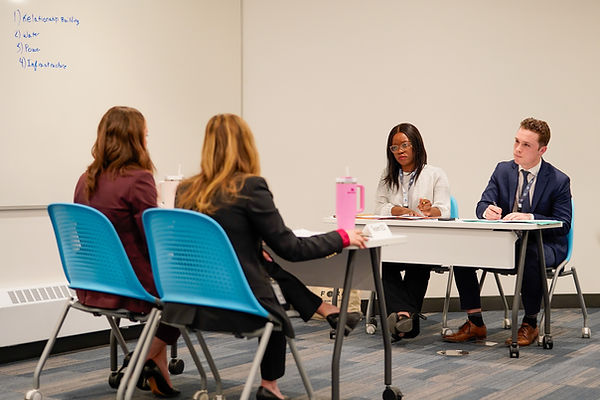About the Competition

The CNNC brings together law students from across Canada to practice and improve their negotiation and problem-solving skills. The competition simulates negotiation in which teams of two law students, acting as lawyers, negotiate a series of legal, social policy and business problems. The competition hosts two concurrent streams, one in English and one in French. The winning teams go on to represent Canada at the International Negotiation Competition with top law school teams from around the world.
Until recently, most competitive moots (popular features of the law curriculum) have focused on appellate advocacy. This competition puts students 'in the boardroom', in bilateral and multi-party negotiations, looking for solutions to complex problems. It also focuses on self-reflection, continuous improvement, and high quality feedback, as panels of volunteer judges (lawyers, members of the judiciary, mediators and business professionals) engage in thoughtful discussions with students about their negotiations. Each team participates in three rounds of realistic simulations of two-party and multi-party negotiation scenarios. The students' self-analysis reflection coupled with the judges' feedback ensures that students will strengthen their skills even further.
Founded in 2017, the CNNC promotes lawyer competency in non-litigation dispute resolution forums and builds networks among Canadian teaching programs. The competition includes a master-class demonstration or talk and some mix-and-mingle social events.
The competition is open to law students from across Canada. Students compete in teams of two, representing their schools. Law faculties can send up to four students in the English stream, and can also send up to four students to compete in the French stream of the event. Universities that have participated in the past include: University of Calgary, University of Alberta, University of Saskatchewan, University of Manitoba, Osgoode Hall Law School of York University, University of Toronto, Western University, University of Windsor, University of Ottawa, University of New Brunswick, Dalhousie University, McGill's Faculty of Law, and l'Université de Sherbrooke. In 2023 and 2024, 52 law students took part in the CNNC.
The French language stream now provides an opportunity for bilingual students from both Civil and Common Law schools to take part - and, even more significantly, for students in French language law school programs in Western Canada to interact with Québec law teams, and receive feedback from French/bilingual/multilingual lawyers and members of the judiciary. The cross-language and cross-cultural component of this competition - all win a problem-solving setting - is unique.
For those interested in learning more about the pedagogical value of the competition, the National Board refers you to a chapter that its members have written: Bruce Curran, Michaela Keet, John Kleefeld, and Gemma Smyth, “The Pedagogical Value of the Canadian National Negotiation Competition” in Laura E Reimer and Richard Jochelson, eds, The Other Side of the Bar: Conflict Transformation in Legal Practice (forthcoming, Springer/Palgrave Macmillan, 2025).
Abstract
The skill set required of lawyers is evolving, and the ability to creatively and expeditiously resolve client concerns through effective negotiation is increasingly important. In this chapter, we argue that negotiation competitions are an excellent method to nurture the knowledge, skills, attitudes, judgment, and values—or competencies—that are vital to law students’ success in legal practice. Such competencies include knowing key negotiation concepts; managing information and process; communicating and relationship-building; advocating for client interests in a problem-solving environment; being aware of and managing one’s own biases; internalizing ethical decision-making in negotiation, and engaging in reflective practice. These competencies are not the focus of certain other kinds of law student competitions, such as appellate and trial moots, which are designed to sharpen legal analysis and rights-based advocacy in an adversarial model. The Canadian National Negotiation Competition (CNNC) departs from that model. It gives law students the opportunity to engage in negotiations like those that lawyers experience in practice and to receive feedback from experts, in either English or French streams. It also invites students to wrestle with complex scenarios that feature both business and broader social policy tensions and objectives. In this chapter, the authors recount their experience with developing, running and growing the CNNC for nine years and highlight some of the key pedagogical lessons learned.

